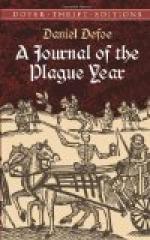Great were the confusions at that time upon this very account; and when people began to be convinced that the infection was received in this surprising manner from persons apparently well, they began to be exceeding shy and jealous of every one that came near them. Once, on a public day, whether a sabbath day or not I do not remember, in Aldgate Church, in a pew full of people, on a sudden one fancied she smelt an ill smell. Immediately she fancies the plague was in the pew, whispers her notion or suspicion to the next, then rises and goes out of the pew. It immediately took with the next, and so with them all; and every one of them, and of the two or three adjoining pews, got up and went out of the church, nobody knowing what it was offended them, or from whom.
This immediately filled everybody’s mouths with one preparation or other, such as the old women directed, and some, perhaps, as physicians directed, in order to prevent infection by the breath of others; insomuch, that if we came to go into a church when it was anything full of people, there would be such a mixture of smells at the entrance, that it was much more strong, though perhaps not so wholesome, than if you were going into an apothecary’s or druggist’s shop: in a word, the whole church was like a smelling bottle. In one corner it was all perfumes; in another, aromatics,[282] balsamics,[283] and a variety of drugs and herbs; in another, salts and spirits, as every one was furnished for their own preservation. Yet I observed that after people were possessed, as I have said, with the belief, or rather assurance, of the infection being thus carried on by persons apparently in health, the churches and meetinghouses were much thinner of people than at other times, before that, they used to be; for this is to be said of the people of London, that, during the whole time of the pestilence, the churches or meetings were never wholly shut up, nor did the people decline coming out to the public worship of God, except only in some parishes, when the violence of the distemper was more particularly in that parish at that time, and even then[284] no longer than it[285] continued to be so.
Indeed, nothing was more strange than to see with what courage the people went to the public service of God, even at that time when they were afraid to stir out of their own houses upon any other occasion (this I mean before the time of desperation which I have mentioned already). This was a proof of the exceeding populousness of the city at the time of the infection, notwithstanding the great numbers that were gone into the country at the first alarm, and that fled out into the forests and woods when they were further terrified with the extraordinary increase of it. For when we came to see the crowds and throngs of people which appeared on the sabbath days at the churches, and especially in those parts of the town where the plague was abated, or where it was not yet come to its height, it was amazing.




